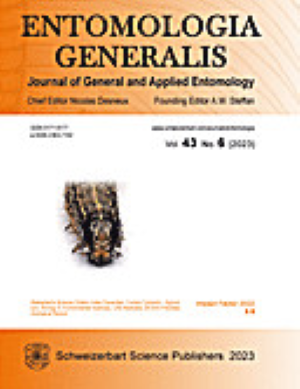Scaphoideus titanus 的预测和管理:何去何从?
IF 4.6
1区 农林科学
Q1 ENTOMOLOGY
引用次数: 0
摘要
Scaphoideus titanus Ball(半翅目:蝉科)是欧洲葡萄栽培业的主要害虫,因为它能高效传播对葡萄树最具破坏性的病原体之一,即多花绒毛葡萄植原体。虽然破伤风蝇在这种疾病的传播中扮演着重要角色,但它也是复杂流行病学循环的一部分,其中涉及几种对植物原体传播具有不同相关性的替代媒介。在此,我们将对破伤风蝇的监测和建模,以及管理这种害虫和限制植原体传播的可用工具进行最新综述。我们研究了以杀虫剂为基础的控制方法;此外还强调了创新的低影响控制方法,如振动交配干扰、生物控制和降低病媒能力的方法。我们还讨论了在实施有效和可持续的控制计划以防治破伤风穗蚊方面新出现的主要挑战。本文章由计算机程序翻译,如有差异,请以英文原文为准。
Scaphoideus titanus forecasting and management: quo vadis?
Scaphoideus titanus Ball (Hemiptera: Cicadellidae) is a major pest for European viticulture due to its high efficiency in the transmission of one of the most destructive pathogens for grapevine, namely flavescence dorée phytoplasmas. Although it plays a major role in spreading this disease, S. titanus is part of a complex epidemiological cycle involving several alternative vectors with variable relevance for phytoplasma spread. Here we provide an updated review on S. titanus monitoring and modelling, as well as the available tools for management of this pest and for limiting phytoplasma transmission and, thus, also spread. Insecticide-based control is examined; additional emphasis is placed on innovative and low-impact control approaches, such as vibrational mating disruption, biocontrol, and methods to reduce vector competence. We also discuss the main emerging challenges to the implementation of effective and sustainable control programs against S. titanus.
求助全文
通过发布文献求助,成功后即可免费获取论文全文。
去求助
来源期刊

Entomologia Generalis
生物-昆虫学
CiteScore
7.10
自引率
18.80%
发文量
72
审稿时长
>12 weeks
期刊介绍:
Its scope covers all aspects of basic and applied research dealing with insects and more broadly with arthropods inhabiting wild, agricultural and/or urban habitats. The journal also considers research integrating various disciplines and issues within the broad field of entomology and ecology.
Entomologia Generalis publishes high quality research articles on advances in knowledge on the ecology and biology of arthropods, as well as on their importance for key ecosystems services, e.g. as biological control and pollination. The journal devotes special attention to contributions providing significant advances (i) on the fundamental knowledge and on sustainable control strategies of arthropod pests (including of stored products) and vectors of diseases, (ii) on the biology and ecology of beneficial arthropods, (iii) on the spread and impact of invasive pests, and (iv) on potential side effects of pest management methods.
Entomologia Generalis welcomes review articles on significant developments in the field of entomology. These are usually invited by the editorial board, but proposals may be sent to the Editor-in-Chief for preliminary assessment by the editorial board before formal submission to the journal. The journal also considers comments on papers published in Entomologia Generalis, as well as short notes on topics that are of broader interest.
 求助内容:
求助内容: 应助结果提醒方式:
应助结果提醒方式:


